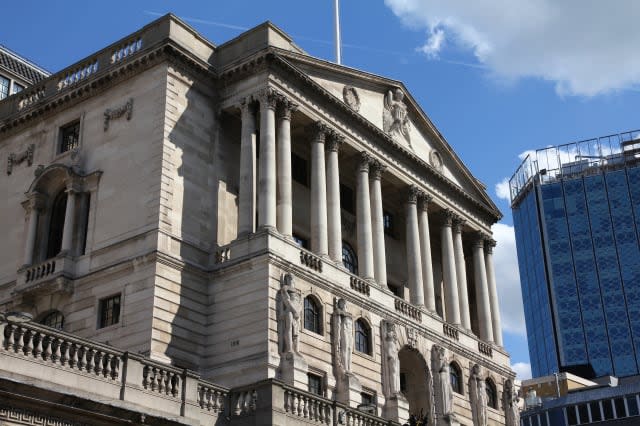Economy will grow at a slower rate - Bank of England

The Bank of England today cut its forecasts for http://money.aol.co.uk/tag/gdp/UK economic growth over the next three years as it published a gloomy outlook for the recovery that also downgraded hopes for rising wages.
It slashed its prediction for gross domestic product (GDP) expansion this year from 2.9% to 2.5% and for 2016 from 2.9% to 2.6%, with the expectation for 2017 also trimmed, from 2.7% to 2.4%.
Policy-makers still think inflation, currently at zero, could turn negative soon before being expected to "pick up notably" towards the end of the year as the effect of oil and food price falls fade, and hitting its 2% target in a couple of years.
In its quarterly Inflation Report, the Bank appeared to endorse market expectations that interest rates would not rise from the current level of 0.5% until the middle of 2016.
Governor Mark Carney said "persistent headwinds" continued to weigh on the UK economy in the wake of the financial crisis, including weak global demand, the squeeze on Government spending and private firms cutting back their debts.
He reiterated the view of the rate-setting Monetary Policy Committee (MPC) that this would mean a more gradual pace of rate rises than in the past as well as rates remaining "below historical levels for some time to come".
Rates would rise to just 1.4% by the middle of 2018 according to market expectations that the Bank said were in line with it meeting its inflation target.
The report predicted wasteful spare capacity or "slack" in the economy being used up within the next year as the recovery picked up and jobs were added.
But the Bank cut its forecast for wage growth this year from 3.5% to 2.5%, blaming the fact that rising employment had continued to be skewed towards lower paid posts.
The report also suggested that the availability of foreign workers to employers might mean that a narrowing of slack - tightening the pool of available labour - no longer had the expected effect of driving up pay.
It came as official figures showed wages grew by 1.9% year-on-year in the January-March period, after they stalled to 1.7% in the three months to February.
Mr Carney said: "Wages have grown by around 2% in the past year - less than half the average rate before the global financial crisis - and the key risk is that these subdued growth rates continue."
He saved his gloomiest language for the issue of productivity - which the Bank now thinks will grow even more weakly than previously thought - expressing frustration at its weakness as it was not something policy-makers could control.
"Productivity growth - doing more with less - is the key determinant of income growth," Mr Carney said.
"Our shared prosperity depends on it."
He revealed that a comprehensive review had found "underlying weakness", adding: "In light of that, we have become even more conservative in our forecast for renewed productivity growth."
The Bank blamed its downgrade of GDP forecasts on slightly higher market expectations about the path of interest rates as well as the strength of the pound.
It also pointed to a more subdued property market weighing on investment in housing, as well as weaker productivity.
Global uncertainties included the possibility of a "disorderly outcome" to Greece's debt crisis - though Mr Carney said an intensification of the crisis "would likely only have a modest downward impact on UK GDP".
Despite the gloom, the Inflation Report still said that "the outlook for growth remains solid" and that it expected some improvement in productivity to support higher wages.
The Bank predicts that the recent GDP figures showing a slowdown in growth in the first quarter to 0.3% will be revised up to 0.5%, while the second quarter will see growth of 0.7%.
Mr Carney pointed to the fact that the economy was growing, unemployment falling, earnings growth improving and that low inflation was showing no evidence of consumers delaying spending.
He added that consumer confidence was at its strongest in more than a decade with real terms take-home pay boosted by lower food and energy prices.
The Bank also published a second letter of explanation from Mr Carney to the Chancellor with inflation more than 1% off the target and said he expected to write further such letters in coming months.
He again stressed that a temporary period of falling prices should not be mistaken for a damaging spiral of "deflation" but reiterated that the Bank could still cut interest rates if necessary should lower inflation persist.
Howard Archer of IHS Global Insight said: "The Inflation Report suggests that interest rates will rise extremely gradually at least through to mid-2018.
"This is likely to be reinforced now that the Conservatives set to press ahead with major spending cuts in the next two to three years, it is very possible that the Bank of England will take interest rates up even more slowly.
"Any hit to economic activity coming from increased uncertainty over a referendum on EU membership in 2017 could also cause the Bank of England to temper interest rate hikes."
Vicky Redwood, chief UK economist at Capital Economics, said the report "supports financial markets' (and our own) view that the Monetary Policy Committee is in no rush to raise interest rates".
Government policy on AOL Money
No change for interest rates after the election
Savers urged: register now to pay no tax on savings interest
What you should know about misleading government accounting





